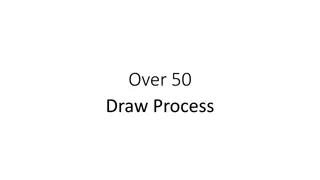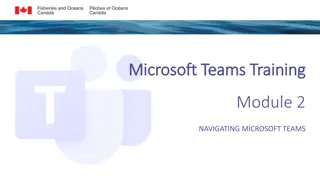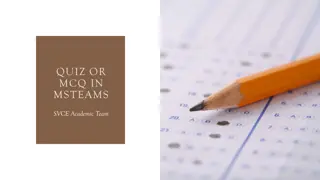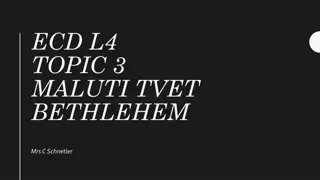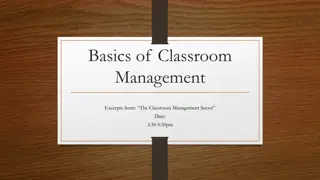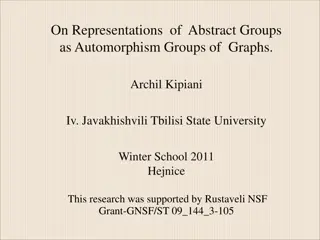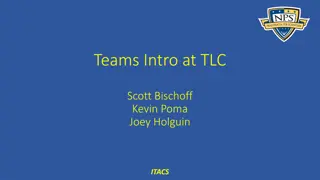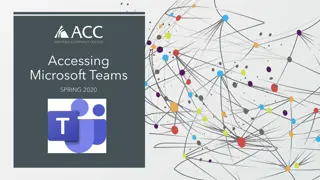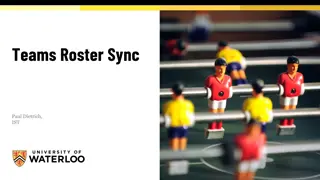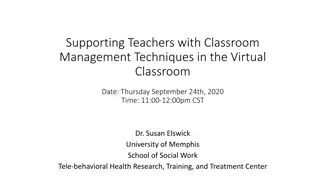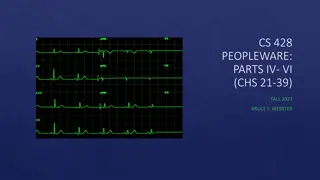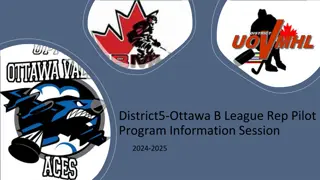Practical Approach to Using Groups and Teams in Classroom Settings
This workshop focuses on utilizing groups and teams in educational environments, providing techniques to form diverse and effective groups, outlining key principles, exploring low and high-risk activities, discussing different forms of peer assessment, and addressing challenges associated with group assessment and functionality. Practical tips and interactive components are emphasized to help integrate groups and teams into classroom settings effectively.
Download Presentation

Please find below an Image/Link to download the presentation.
The content on the website is provided AS IS for your information and personal use only. It may not be sold, licensed, or shared on other websites without obtaining consent from the author. Download presentation by click this link. If you encounter any issues during the download, it is possible that the publisher has removed the file from their server.
E N D
Presentation Transcript
Using Groups and Teams: A Practical Approach Forming, Using, and Troubleshooting Groups and Teams
Before we begin the proceedings, I would like to acknowledge, honour, and pay respect to the traditional owners and custodians, of the land on which we meet. We are gathered here on the ancestral and unceded territory of the Mi gmaw people, land that forms part of Mi kmagi, the region we associate today with the Maritime provinces, that is covered by the Treaties of Peace and Friendship, which the Mi gmaw and the Maliseet Peoples first signed with the British Crown in 1725.
In this two hour workshop we will focus on how to use groups / teams in the classroom. We will focus on techniques that can be used to form diverse and effective groups/teams. We will outline the key principles about how to use groups/teams, and we will consider both the low risk and the high risk activities teams can undertake, including such diverse group activities as discussion groups, cross-over groups, debates, Readiness Assurance Activities, and games. We will also examine some different forms of peer assessment and tackle some of the challenges that come with assessing groups. Finally we will explore some of the biggest challenges in using teams in the current classroom; developing teams in accordance with the principles of student accessibility and figuring out how to deal with teams that become dysfunctional. This workshop will emphasize practical tips to help integrate groups/teams into your classes, and will include strong interactive components.
Questions to Form Diverse Permanent Teams From Dr. Brent MacLaine Expertise in the use of groups, I have read several articles about the effective use of groups/teams............25 I have attended a presentation or seminar about using groups/teams..........20 I have listened with interest when colleagues talk about using groups ..10 Practical experience with groups I always use groups or teams in my classes ....................25 I regularly use groups or teams in my classes ...........20 I occasionally use groups or teams in my classes .....15 I rarely use groups in my classes..........................................5 Attitude towards the use of groups in class I think groups/teams are an essential tool in engaging and retaining students.......20 I think groups/teams can help supplement lectures .......................................15 I think groups are useful but I am more comfortable giving lectures .....................10 I avoid groups or teams due to the problems associated with using them .. .5 Willingness to work in Groups I consider myself outgoing and like to help a group achieve goals............20 I am sometimes a leader and sometimes a follower.................................15 I consider myself shy and prefer to help a group in quiet ways.................10 I consider walking my dog a significant group experience.........................5 .
Questions to form groups in a Third Year English Course. Interest in Reading Literature If you have read two books of serious fiction during the summer break............20 If you have read a one serious novel (not on a text list) during the summer.......15 If you have read a romance or horror novel outside class in the last year............5 Interest in Canadian Studies If you have taken three or more courses in Canadian literature, history or politics.........20 If you have taken one or two courses in Canadian literature, history or politics..............15 If you regularly read Macleans, listen to CBC radio, or watch the national news...........10 If you pick up most of your information about Canada on Fox News...............................2 Experience within the Discipline If you have accumulated 30 or more credit hours in English........................20 If you have accumulated between 18 and 28 credit hours in English............15 If you have accumulated 9 or more credit hours in English..........................10 If this is your first English course.....................................................................5 Group Work Index I consider myself outgoing and like to help a group achieve goals..........20 I am sometimes a leader and sometimes a follower.................................15 I consider myself shy and prefer to help a group in quiet ways...............10 I consider walking my dog a significant group experience.......................5 If I have to work in another freakin group... ...........................................0
FORMING PRODUCTIVE TEAMS: Long-term, permanent teams work best if they are diverse, heterogeneous, and formed by the teacher. Diverse teams mix strong and weak students to the benefit of each. Diverse teams should still pair minorities to ensure active participation. (Felder and Brent, 2001)
Using Teams: Three components which help create effective teams: Clear norms Engaging and Appropriate Activities Peer-Assessment
Qualities Possessed by Effective Team Members Since the final mark for this course is based partly on the performance of the team, it is a good idea to consider what could make your team as successful as possible. Experience shows that the most successful teams contain members who exhibit the following behaviours: A GOOD TEAM MEMBER.... *attends regularly and makes an effort to participate * concentrates on the question or the assignment at hand *shares the responsibility of helping the team achieve its best results * is well prepared * listened carefully and is considerate of other s opinions * contributes as well as listens * does not distract others in the group and is careful not to compromise the team s work * informs members if she/he is unable to attend a group meeting * finds ways to contribute even if he/she has to miss a meeting Feel free to adjust this list to meet the needs of your groups.
Using Low Risk Team Activities To Assist Content Delivery Think / Pair / Share Discussion Groups (discussion/report; fishbowl; cross-over) Games: Jeopardy Readiness Assurance Process (I-RATS and T-RATS)
BOIL IT DOWN EXERCISE FROM DR. SANDRA BELL Think, Pair, and Share: There are (at least) six principles which can help ensure that a group activity is successful. First, on you own, please consider the principles below, examine why these ideas would help a group function in a productive way, and decide which are the two most important principles. With your team compare your chosen two and collectively decide which two are most important. Activities should: be do-able. address key course material. promote learning and team building simultaneously. have clearly defined outcomes or products. be given enough time be rewarded appropriately.
Discussion Groups Discussion/report: Questions handed out a week in advance. For the ten minutes the small discussion groups will meet to formulate -- and later to articulate through a group spokesperson -- a thoughtful response to one of the topics to be covered during the general class discussion. Students are expected to come to class prepared to engage in an informed discussion on all topics, not only the topic for which they and their group happen to be responsible in any given week" (From Dr. James Noble) Fishbowl Cross-over
Discussion group Activity Statement: Work by Deeter and Schmertz (2002) and Oakley, Fender (2004) indicated that students who work in teams benefit both in terms of their academic performance and in terms of the development of their personal and social skills. Task: On one of the recipe cards, as a group, identify and list two specific ways in which a student s academic skills and abilities would be enhanced by being a member of team throughout a term. Identify and list two ways in which a student might benefit or grow personally or socially. Output: Please ensure that each member of your team has, on their own card, the same list of four ideas.
Readiness Assurance Process From Dr. Larry Michaelson Individual Readiness Assurance Tests Team Readiness Assurance Tests
Answers for Readiness Assurance Test 1. a-2 2. c-2 3. b-2 4. d-2 5. True - 2
Using High Risk Groups/Teams Students use course Content Case studies, Seminars, Projects Pechakucha, Formal Debates,
Pechakucha Each group is to prepare a Pechakucha on one of the authors listed below. You cannot do a Pechakucha on the author you are working on for the debate. A Pechakucha is a timed power point presentation. It contains 20 slides at 20 seconds per slide for a total of 6 minutes and 40 sec. Each group member will develop and (in most cases) present a portion of the Pechakucha. After the slides are presented they will be posted on D2L. The presentations will then become a resource which the class as a whole can use. Pechakucha presentations need to be sent to me as an email attachment before midnight the day before they are due. I will add the timer animation and bring the presentation to class on my laptop. The twenty slides are to be divided up in the following way: 5 slides - Biography 4 slides - Main Literary or Artistic works 4 slides - Literary Styles used in the text we are studying. 3 slides - Bibliography of literary/scholarly resources: (1 for books, 1 for articles, 1 for web resources) 4 slides - Influence on Children s lit or the wider culture (this includes imitations, sequels, versions in other media, stylistic shifts)
Formal Debates The Rules: --Each group will sign up for one side of one debate. --After reading the text carefully and well ahead of time, meet as a group in the days preceding the class and develop your arguments while continually anchoring your ideas in the text. --Select one speaker who will present your opening 3 minute argument. We will always begin with the argument for the Pro side. You must also select a second speaker who will present a 1.5 minute rebuttal of your opponent s position or a further defence of your group s position. -- Avoid unsupported flights of rhetoric, and be prepared to discuss and defend your position in a wide- open forum following the formal debate. -- At the end of the debate submit a typed copy of your opening argument. A three minute argument will likely translate into approximately 2-3 pages. -- Following the formal debate all members of the class, including the participants in the debate, will clarify where they stand on the issue being discussing by taking part in an activity call Take a Stand. (I ll explain how this works in class) Week 6/7 Between October 12-21 Margaret Laurence, A Bird in the House Topic #1: Be it resolved that Vanessa s personality has been shaped more by her grandparents than by her parents. Pro Con Group #___3____ Group #___7_____
Assessing Team Work: Forms of Peer Assessment: -Rating Scales using 5 point Likert-type scale -Allocations of Points: -Peer Comparisons/ Peer Rankings. -Project Diaries:
Peer Assessment Name:_____________Student Number:______Team Number:____ This is your opportunity to evaluate the contributions of your peers to your team. Rank each member of your team (excluding yourself). Give the #1 ranking to the member who has made the strongest contribution to the group. Give the lowest ranking to the individual whose participation was least helpful. After each student has ranked each member of their group, I will convert the rankings into a mark. You should consider the following criteria as you determine the rank of your group members: A GOOD TEAM MEMBER.... *attends regularly and makes an effort to participate *concentrates on the question or the assignment at hand *shares the responsibility of helping the team achieve its best results * is well prepared, listened carefully, and is considerate of other s opinions contributes as well as listens does not distract others in the group and is careful not to compromise the team s work * informs members if she/he is unable to attend a group meeting *finds ways to contribute even if he/she has to miss a meeting Note: You must give a spread of ranks, and you must justify each of your rankings on the reverse of this sheet. Please explain why you gave the ranking you did, and include if you like any suggestions you would like to pass on which you think might help your fellow student improve. If you wish to assign two individuals the same rank, you must also explain your reasons on the reverse. Students Name and Rank 1________________________________ 2________________________________ 3________________________________ 4________________________________
Sample Peer Rankings (When things go well) Student A, Student B, Student C, and Student D were all excellent team members. They were always prepared, focussed and positive. Group brainstorming for the debate was great. I ranked Student A slightly higher for his work on the debate, he edited the final copy. His insights into the text were helpful. He helped me to view the novels in different ways. He was always polite and allowed other to share their thoughts as to why they felt a certain way about the novel. Student B s contribution of organization always kept us on track. Strong in the CRRs. (Always there and very helpful. She made me feel really comfortable sharing my ideas) Student C was always there and brought quoted evidence to the discussions and debate. Student D She did great at first but near the end she stopped coming. She was perhaps more sporadic in communication.
Sample Peer Rankings (When things do not go well) Student E however, did not really contribute. He didn t always have the material read and was reluctant to speak. I m note [sic] sure if he was shy or just not interested, But for what he did read he tried to participate. Student E deserves the lowest spot in the group because he was rarely prepared. He bluntly told us at the first CRR that he did not read the book, since he read it in high school, and worked on his car instead. Also he had not finished the novel when we had meetings for our debate. He was absent from both group discussions. Student E left when there were discussions and did nothing to help us on the debate. He didn t read the book. We were definitely not happy with him. As for Student E I would be surprised to learn he had read any of the assigned texts and, aside from the fact that I m sure he s a very lovely human being, his presence in the group was, to be frank, absolutely pointless.
When Things start to go astray Developed with Cheryl Kennedy Invitation to the Professor to Assist Group #________ Date:________________ We wanted to let you know that our group is experiencing a problem. One of the group members is not acting in accordance with the group s code of conduct and we think this behaviour is compromising the work of the group as a whole. Optional Section: In order to assist with the process we have provided the following information about the problem:
Using teams in accordance with the principles of student accessibility UDL Universal Design for Learning. Advantages and Tensions
Works Cited Baker, Diane. Peer Assessment in Small Groups: A Comparison of Methods. Journal of Management Education 32,2 (April 2008): 183-209. Burdett, Jane. Degrees of Seperation Balancing Intervention and Independence in Group Work Assignments. The Australian Educational Researcher. 31, 1 (April 2007): 55-71. Creelman, David. Formal Debates as a Class Activity. Teaching Matters. Jan. 2006. http://www.unbsj.ca/vpetc/documents/TMJan2006.pdf Deeter-Schmertz, D., Kennedy, K, and Ramsey R. Enriching our understanding of Student Team Effectiveness. Journal of Marketing Education. 24, 2 (2002): 528-541. Felder, Richard and Rebecca Brent. Effective Strategies for Cooperative Learning. Cooperation and Collaboration in College Teaching 10,2 (2001): 69-75. Galbraith, D. D., & Webb, F. L. (2013). Teams that work: Preparing student teams for the workplace. American Journal of Business Education, 6(2), 223-234 Kriflik, Lynda and Judy Mullan. Strategies to Improve Student Reaction to Group Work. Journal of University Teaching and Learning Practise 4, 1 (2007):13-27. Laiken, M. The anatomy of high-performing teams: A leader's handbook (3rd ed.).Toronto: University of Toronto Press, (1998). Michaelsen, Larry. Team Based Learning: The Power of Teams for Powerful Learning. Accessed 24/09/2008. http://www.ou.edu/pii/teamlearning/index.htm Oakley, Barbara, Richard Felder, Rebecca Brent and Imad Elhajj. Turning Student Groups into Effective Teams. Journal of Student Centered Learning. 2, 1 (2004): 9-34. Stein, R.F and S. Hurd. Using Student Teams in The Classroom. Bolton, M.A. : Anker Publishing Co., 2000. Zeff, L.E. and Higby, M.A. Teach More Than You Know. Academic Exchange Quarterly, 6,3 (2002): 155- 160.
Contact Information David Creelman Department of Humanities and Languages University of New Brunswick P.O. Box 5050 Saint John, N.B. E2L 4L5 Phone: 506-648-5648 Email: creelman@unbsj.ca




